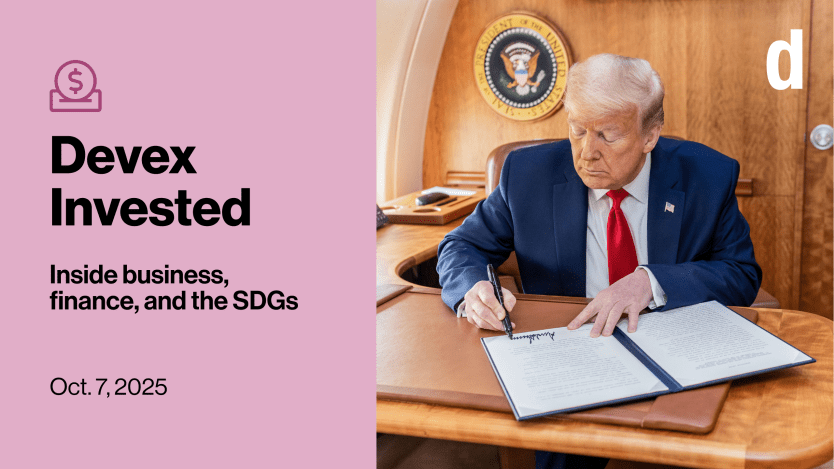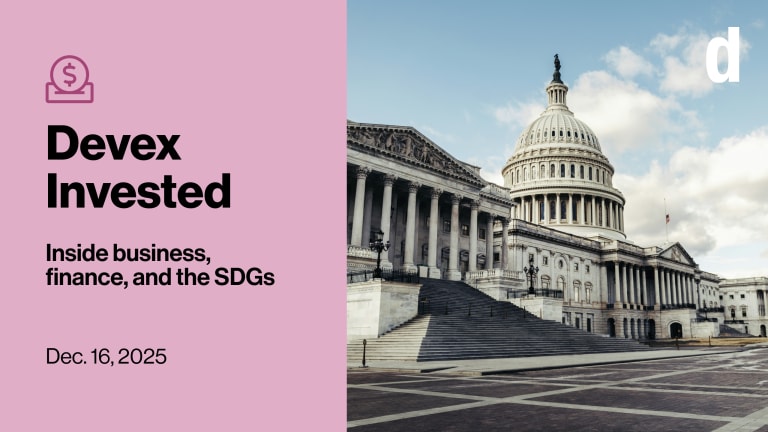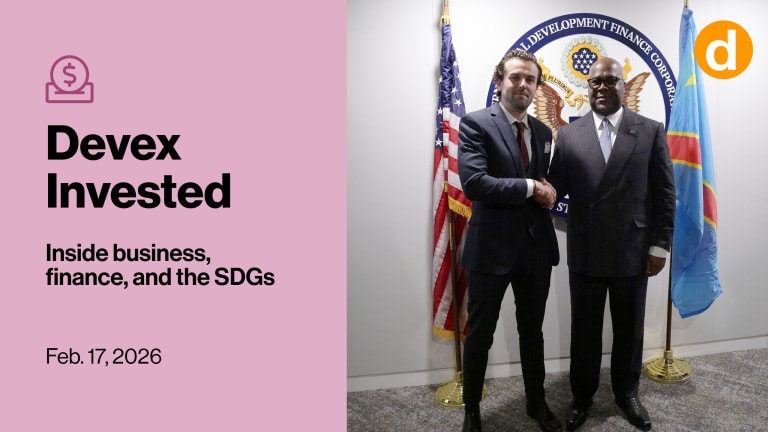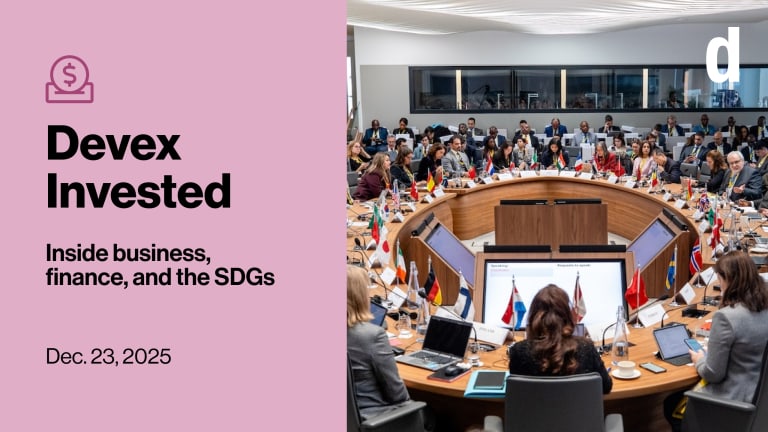Presented by The Global Energy Alliance for People and Planet

The U.S. International Development Finance Corporation’s authorization to operate lapsed yesterday — amid a broader U.S. government shutdown — further hamstringing the agency after an already disrupted year with far fewer investments than usual.
So how did an agency with bipartisan support in Congress and support from the Trump administration fail to get renewed in time?
The expiration of DFC’s seven-year authorization is the “collateral damage” of congressional disagreements about a short-term budget extension, congressional priorities, and more, Rob Mosbacher, who led DFC’s predecessor agency, tells me. The hope was that DFC would be reauthorized months ahead of the deadline, but that didn’t happen — and “at the rate things are going, it won’t be anytime soon,” he says.
As I’ve reported, DFC has bipartisan support in both the House of Representatives and the Senate, though the two chambers have different proposals for what exactly a reauthorization should look like (I’ve written about them here and here). Despite that support, a reauthorization bill could not make it across the finish line before the Oct. 6 deadline. Hopes that a short-term extension could be part of a stopgap funding bill also fell apart — so the government shut down when the fiscal year ended on Sept. 30.
So what happens now? DFC has enough funding to operate with limited staff during a short-term government shutdown and to avoid any contract breeches, according to a document with shutdown guidance that Devex obtained.
During a shutdown, DFC will continue to honor insurance and financing contracts. The agency will not make new commitments, do noncore business, recruit or train staff, or do nonemergency procurement, according to the shutdown guidance.
As with most government agencies, a limited number of DFC staff are considered essential and continue to work during a shutdown — about 162 of DFC’s 526 employees fall into this category, according to the document. (For those keeping track, that means DFC has lost about 200 employees since the start of the year.)
But even once the government reopens, DFC will need at least a temporary extension of its authorization to undertake new activities. Pending that authorization, it will service its portfolio, honor existing legal commitments, collect fees, insurance premiums and loan repayments for existing transactions, according to a DFC spokesperson.
Why does it matter? The refrain I’ve heard repeatedly is that the private sector likes certainty — and at the moment, working with DFC doesn’t provide that, and the delays as the Trump administration came into office combined with this lapse in authorization could drive away potential clients. Some companies will look at DFC and say they can’t afford to take the chance, Mosbacher tells me. But the reputational damage should only be temporary if DFC can quickly get back on track so companies feel they can work with the agency in a timely manner, he adds.
One thing that might help with that is if DFC has a new CEO in place. Benjamin Black is awaiting a vote in the Senate to confirm him for the post — which may happen in the next week or two, sources tell me.
But even with a new CEO, it will be up to Congress to hash out its differences — there is agreement on a number of changes for DFC, but with different approaches.
“I hope Congress will commit to working from this common ground to extend DFC’s authorization, increasing the agency’s agility while ensuring it remains focused on lower-income markets where development finance is most needed,” Erin Collinson, the director of policy outreach at the Center for Global Development, tells me.
Background: Trump has big plans for DFC as reauthorization deadline looms
ICYMI: A Senate plan for DFC reauthorization
See also: US House committee debates DFC reauthorization
A rebound for ESG?
Environmental, social, and governance, or ESG, investing has been on a roller coaster ride of late, going through a moment in the sun and then facing significant challenges. But it’s not dead yet, my colleague Elissa Miolene reports.
Sustainable assets in the U.S. grew more than 18-fold between 1995 and 2018, capturing roughly one in every four dollars under management at their peak. But as the term became politicized and investors questioned what ESG actually meant, the movement hit turbulence. Money flowed out — including the sector losing $8.6 billion earlier this year — regulations tightened, and the acronym itself became a liability, Elissa reports.
But there has been a bit of a rebound, largely led by European investors. And what seems clear is that what was ESG investing may look or sound different. It may lose the label and be called by a different name as companies rebrand their efforts, and some regulators are pushing for clearer standards.
“I personally believe it’s all going to change, and come back even stronger,” Renat Heuberger, the chief executive officer of Terra Impact Ventures, told Elissa at the Building Bridges conference last week. “It’s always going in waves. But right now, where we are, we have to be very mindful of profitable business cases.”
Read: The boom, bust, and bounce back of ESG
Recap: Can finance fix the future? Building Bridges takes a shot
Related: Why reports of ESG’s death are ‘greatly exaggerated’
Bridging the gap
The Inter-American Development Bank Group has launched a new initiative called ReInvest+ aimed at bringing more private capital into climate investments in developing countries.
Current funding doesn’t meet vast needs, and there is a mismatch between what investors prefer: hard-currency securities, and what most projects need: early-stage capital, often in local currency.
“Until now, we have asked institutional investors to change their risk appetite to invest in projects in developing countries. That approach has proven too costly and unscalable. With ReInvest+, we are flipping the script,” IDB Group President Ilan Goldfajn said in a statement.
It plans to do so by taking proven performing loans on local bank balance sheets, adding portfolio insurance, and turning them into investment-grade, hard-currency securities that institutional investors can buy. Loans are purchased to be part of the initiative only if the banks commit to reinvesting profits.
A study IDB commissioned found that about $500 billion worth of loans in Latin America and the Caribbean exist that could be part of such a scheme and the global pool could exceed $3 trillion. IDB has put out a call to banks looking to partner and will announce initial partners and plans for asset purchases at the United Nations’ COP30 climate summit next month.
+ Will climate finance be a priority at next week’s World Bank-IMF annual meetings, and what are the issues on the front burner in this time when deliberations are as much about politics as policy? Join me and a panel of experts tomorrow at 1 p.m. ET for a preview of what to expect at the meetings.
We’ll also be live in Washington, D.C., hosting hard-hitting panel discussions, one-on-one interviews, and behind-the-scenes reporting at the Devex Impact House on the sidelines of the annual meetings. Register here to join us live or virtually from Oct. 15–16 and check out our agenda and lineup of speakers.
Le pouvoir of the purse
Your next job?
Senior Executive for the Sectoral Analysis
Corporación Andina de Fomento
Chile
France’s aid budget may be shrinking, but its development finance engine remains strong, according to an analysis by my colleague Miguel Antonio Tamonan. The French Development Agency, AFD, manages a nearly €21 billion (around $24 billion) active portfolio, with a model that stretches each euro of public subsidy into twelve — thanks to heavy reliance on loans from private investors, funds, and central banks. For investors, that leverage matters: Roughly 85% of AFD’s resources now come from market financing.
The pipeline is big and geographically diverse, but with a clear tilt toward climate and infrastructure. Sub-Saharan Africa leads with €7.1 billion, while India, Brazil, Turkey, and Kenya anchor the country portfolio. Energy, water and sanitation, and climate-tagged projects dominate, with transport and sustainable cities close behind. For private capital, AFD’s model creates multiple entry points — cofinancing opportunities worth another €12 billion annually, and projects designed with long-term development backing. As donors retrench, AFD is positioning itself as both borrower and mobilizer, offering investors structured ways to align with climate priorities while tapping large-scale infrastructure pipelines in emerging markets.
Read: The state of French aid — a look into AFD’s €21 billion portfolio (Pro)
+ Not yet a Devex Pro member? We have a 15-day free trial for you to explore member benefits including deeper funding insights and insider reporting, members-only briefings with sector leaders and policymakers, priority access to in-person development events and summit roundtables — and you’ll help keep essential journalism open for others.
What we’re reading
The Net-Zero Banking Alliance folds after mass exodus by members. [Reuters]
Brazil and China team up to create a new investment fund. [Bloomberg]
Are companies actually scaling back their climate commitments? [Harvard Business Review]








